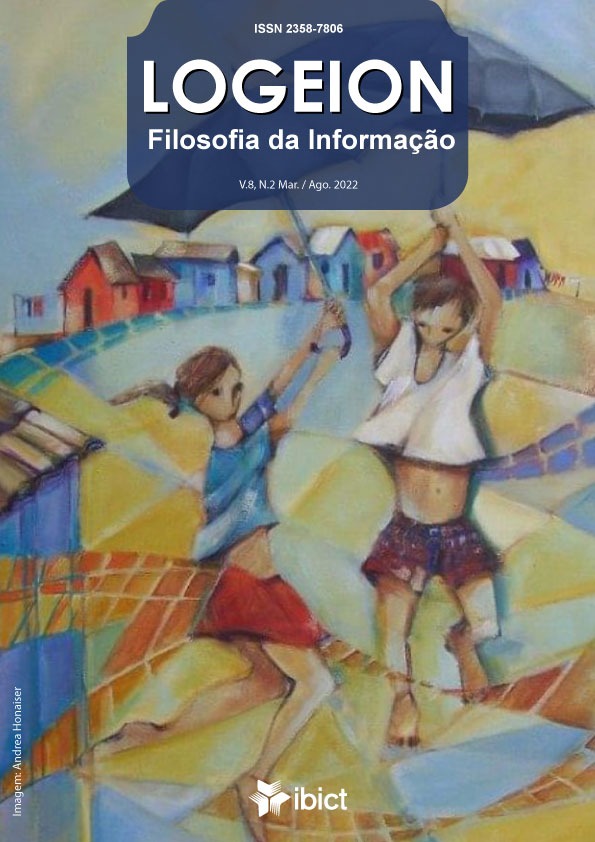From the physical paradigm, to struggles and symbolic field in information science
deflections
DOI:
https://doi.org/10.21728/logeion.2022v8n2.p116-129Keywords:
Physical paradigm, Information Science, Symbolic field, Epistemological obstacle, StrangenessAbstract
It considers the epistemological conceptions of the physical paradigm of IC, constituting it as the dominant in the genesis of IC, based on the relationships of the Empirical-Analytical Sciences systematized in technical rules of empirical knowledge, and constituting the other cognitive and social paradigms. The physical paradigm of IC is problematized, symbolically producing epistemological obstacles to the concept of information in the scientific field, as discussed by Bourdieu (1989), Capurro (2003) and Gonzalez de Gomez (2000). In addition, the central conception in the text by Gonzalez de Gomez (2000) that information is floating and produces different meaning effects in different contexts, the “information” stands out. Therefore, this is a theoretical study, with a critical and interpretive approach on the physical paradigm in IC, whose development was based on self-reflection, as it is in this methodological framework that the meaning of the validity of this category of critical statements is established. Putting the physical paradigm to an understanding of emancipatory interest in knowledge, contrasting discursive relationships with hypostasized powers. Therefore, what is needed is a reconstruction properly guided by the theoretical understanding in which, according to González de Gomez (2000), he highlights information as a floating term and can be inserted in different areas and contexts. This causes and promotes an internal dispute in the field of CI with the paradigms. With cultural studies in information, however, it can be said that, compared to the theorists who defend the physical approach in the field of IC, there is a constitution of studies, crossed in "status" or "power". The place of influence of other paradigms is still shy compared to the recognition of the physical paradigm. It becomes necessary to understand and realize these cracks, seeking an epistemological reconstruction in this paradigm.
Downloads
References
ALFARO LÓPEZ, H. G. La biblioteca como obstáculo epistemológico. México: UNAM, Centro Universitário de Investigaciones Bibliotecológicas, 2010. p.2-41 Disponível em: https://libros.metabiblioteca.org/bitstream/001/216/8/978-607-02-0748-8.pdf. Acesso em: 25 maio 2021.
ALMEIDA, Daniela Pereira dos Reis de; ANTONIO, Deise Maria; BOCCATO, Vera Regina Casari. GONÇALVES, Maria Carolina. Paradigmas Contemporâneos da Ciência da Informação: a recuperação da informação como ponto focal. Revista Eletrônica Informação e Cognição, v.6, n.1, 2007. Disponível em: https://www.brapci.inf.br/_repositorio/2010/03/pdf_fc4f01292e_0008415.pdf. Acesso em: 04 dez. 2021.
ARAÚJO, Carlos Alberto Ávila. Teorias e tendências contemporâneas da ciência da informação. Inf. Pauta, Fortaleza, CE, v. 2, n. 2, jul./dez. 2017. Disponível em: http://www.repositorio.ufc.br/bitstream/riufc/33233/1/2017_art_caaaraujo.pdf. Acesso em: 01 dez. 2021.
ARAÚJO, Carlos Alberto Ávila. O que é Ciência da Informação. Belo Horizonte: KMA, 2018.
ARAÚJO, Carlos Alberto Ávila. EXISTE UM PENSAMENTO INFORMACIONAL IBERO-AMERICANO?. Logeion: Filosofia da Informação, v. 4, n. 2, p. 31-55, 2018.
ARAÚJO, Carlos Alberto Ávila. Em defesa de um pensamento informacional ibero-americano. XI ASOCIACIÓN DE EDUCACIÓN E INVESTIGACIÓN EN CIENCIA DE LA INFORMACIÓN DE IBEROAMÉRICA Y EL CARIBE. 2018. Anais... Disponível em: http://enancib.marilia.unesp.br/index.php/EDICIC_2018/EDICIC_2018/paper/viewFile/1711/1957. Acesso em: 04 dez. 2021.
BACHELARD, Gaston. A formação do espírito científico: contribuição para uma psicanálise do conhecimento. Rio de Janeiro: Contraponto, 1996.
BOURDIEU, Pierre. Os usos sociais da ciência: por uma sociologia clínica do campo científico. São Paulo: Unesp, 2004.
BOURDIEU, Pierre. O poder simbólico. Lisboa: DIFEL; Rio de Janeiro: Bertrand Brasil, 1989.
BOURDIEU, Pierre. Homo academicus. Florianópolis: Editora da UFSC, 2011.
BOURDIEU, Pierre; PASSERON, Jean-Claude. A Reprodução: Elementos para uma Teoria do Sistema de Ensino. 2. ed. Petrópolis: Ed. Vozes 2009.
CAPURRO, R. Epistemologia e CI. In: ENCONTRO NACIONAL DE PESQUISA EM CI, 2003, Belo Horizonte. Anais [...] Belo Horizonte: ENANCIB, 2003. p. 1-21. Disponível em: http://www.capurro.de/enancib_p.htm. Acesso em: 12 jun. 2016.
CAPURRO, R.; HJØRLAND, B. O conceito de informação. Perspectivas em CI, Belo Horizonte, v.12, n. 1, p. 148-207, jan./abr. 2007. DOI: https://doi.org/10.1590/S1413-99362007000100012. Disponível em: https://www.scielo.br/j/pci/a/j7936SHkZJkpHGH5ZNYQXnC/?lang=pt#. Acesso em: 11 jun. 2021.
GONZÁLEZ DE GÓMEZ, M. N. Metodologia de pesquisa no campo da CI. DataGramaZero – Revista de CI, Rio de Janeiro, v. 1, n. 6, dez. 2000. Disponível em https://ridi.ibict.br/bitstream/123456789/127/1/GomesDataGramaZero2000.pdf. Acesso em: 09 jul. 2021.
HABERMAS, Jurgen. Técnica e Ciência como “ideologia”. Lisboa: Edições 70, 2009.
HJØRLAND, B. Library and information science: practice, theory, and philosophical basis. Information Processing and Management, [S. l.], v. 36, p. 501-531, 2000.
KARPINSKI, Cezar. Epistemologia e CI: fundamentos teóricos e produção bibliográfica nacional. In: XIX ENCONTRO NACIONAL DE PESQUISA EM CI, 2018. Anais [...] Londrina: 2018.
MARTELETO, Regina Maria. Cultura informacional: construindo o objeto informação pelo emprego dos conceitos de imaginário, instituição e campo social. Ciência da Informação, Brasília, v. 24, n. 1, p. 1-8, 1995.
MARTELETO, Regina Maria. O lugar da cultura no campo de estudos da informação: cenários prospectivos. In: LARA, Marilda Lopes Ginez; FUJINO, Asa; NORONHA, Daidy Pires (Org.). Informação e contemporaneidade: perspectivas. Recife: Néctar, 2007. p. 13-26.
VELHO, Gilberto. Observando o Familiar. In: Oliveira, Edson. A Aventura Sociológica. Rio de Janeiro: Zahar, 1978.
Downloads
Published
Issue
Section
License
Copyright (c) 2023 Logeion: Filosofia da Informação

This work is licensed under a Creative Commons Attribution-NonCommercial-ShareAlike 4.0 International License.
The journal is published under the Creative Commons - Attribution - Noncommercial - Share Alike 3.0 Brazil.
The published work is considered collaboration and therefore the author will not receive any remuneration for this as well as anything will be charged in exchange for publication.
All texts are responsibility of the authors.
It’s allowed partial or total reproduction of the texts of the magazine since the source is cited.




